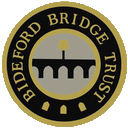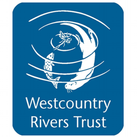Up the river Torridge from Appledore
|
Why not take a boat trip up the beautiful river Torridge? Note the changes from wide open estuary, past busy town harbours and quays to a narrow river with water meadows and trees dipping their branches in the water. As Dave says “the Torridge has so much history. Skippers Dave or Gary regale you with so many stories, you need only go once and you will remember at least one fascinating or fantastical tale to regale your friends and visitors with.
The article below is one I wrote for the North Devon Journal after my first trip upriver with Dave. Re-reading it I noticed I used the line 'every boat tells a story' the tagline for Boat Stories. So that boat trip could take credit as the inspiration behind the series. |
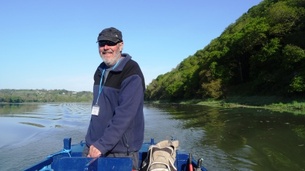 Dave skipper of Cheeky Monkey
Dave skipper of Cheeky Monkey
ALL ABOARD THE CHEEKY MONKEY with Dave Gabe
“Dave has an encyclopaedic knowledge of everything that moves on the river” says my Dad, of our skipper. I am taking my parents and daughter Holly for a family day out on the Cheeky Monkey, up the river Torridge, all the way to Weare Giffard in the hope of seeing wildlife, stunning views, and drifting lazily in the sunshine…
We don’t see the sun, but it doesn’t matter, because from the moment we leave the quay at Appledore, Dave Gabe talks non-stop, bringing every fishing trawler or rusting hulk moored along the river to life. He knows which seas it has sailed, its job, who has tried to turn it into a café or houseboat, who has fallen out with who. He tells tales of smuggling, bankruptcy, family disputes or broken love affairs, which give each boat a new purpose in life –or leave it moored, silently waiting. We pass one rotting hull, lying forlornly in the mud, like the bleached skeleton of a giant whale. “The old schooner, which the navy didn’t look after very well.” Dave has the same dry sense of humour as many a salty sea-dog. Some of his stories seem so fantastical that I wonder if we’re playing call my bluff. Like the merchant who had the contract to take convicts to Australia, but dropped them off on Lundy instead, where obligingly they built many of the stone walls! But then this is remote North Devon. And for hundreds of years the rivers were the major highways between the high seas and the rest of the England and boats was the business to be in.
“Dave has an encyclopaedic knowledge of everything that moves on the river” says my Dad, of our skipper. I am taking my parents and daughter Holly for a family day out on the Cheeky Monkey, up the river Torridge, all the way to Weare Giffard in the hope of seeing wildlife, stunning views, and drifting lazily in the sunshine…
We don’t see the sun, but it doesn’t matter, because from the moment we leave the quay at Appledore, Dave Gabe talks non-stop, bringing every fishing trawler or rusting hulk moored along the river to life. He knows which seas it has sailed, its job, who has tried to turn it into a café or houseboat, who has fallen out with who. He tells tales of smuggling, bankruptcy, family disputes or broken love affairs, which give each boat a new purpose in life –or leave it moored, silently waiting. We pass one rotting hull, lying forlornly in the mud, like the bleached skeleton of a giant whale. “The old schooner, which the navy didn’t look after very well.” Dave has the same dry sense of humour as many a salty sea-dog. Some of his stories seem so fantastical that I wonder if we’re playing call my bluff. Like the merchant who had the contract to take convicts to Australia, but dropped them off on Lundy instead, where obligingly they built many of the stone walls! But then this is remote North Devon. And for hundreds of years the rivers were the major highways between the high seas and the rest of the England and boats was the business to be in.
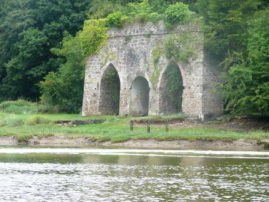 lime kilns dotted along the river
lime kilns dotted along the river
Every
boat or building tells a story. The sailing ships carried lime to the kilns
dotted all the way up the Torridge. The lime was needed to fertilise the soil
and used for mortar and lime wash to paint houses. The old wooden gravel barge
whose skipper used a long pole, a bit like a punting pole to find the substrate
he wanted. The crew sat and waited until the tide went out, then shovelled the
gravel up into the boat. The shovels were numbered based on how tall a man was
– how long he could keep his head above water?! Then somehow, laden to the
gunnels, with the help of the incoming tide, they rowed the gravel back to
port. The old minesweeper, its job to cut the moorings, so the mines bobbed to
the surface and the sailors could shoot them with rifles! When Dave was a boy
on the trawlers, they caught a mine in one the nets and cut it free. Years later he ran his own trawler out of
Appledore and he has also been lifeboat man, lighthouse keeper, and
Lundy boatman. My Mum recognised him straight away as our local fishmonger
from South Molton market! But Dave says he gets most satisfaction from taking
people out on the water and never tires of going up and down the ever-changing
river.
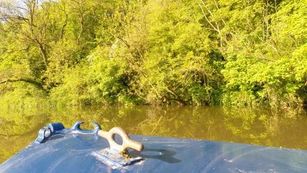 ducking under branches as the banks close in
ducking under branches as the banks close in
As
we pass under the old railway bridge, Dave is quieter as we look out for
wildlife. The kingfishers, he tells us, will come later, the shelduck families
have pushed off to Bridgewater Bay, but we spot little egrets, swans, Canada
geese “the birds that couldn’t be bothered to migrate home” and cormorants
roosting in the trees. And terns? I have the advantage of binoculars and am
pretty sure they are blackheaded gulls, not least because they have black heads
rather than black caps. I challenge Dave who replies, “I’m an expert on
seabirds, black ones, white ones and black and whites ones.” He’s joking of
course, as a fisherman he knows his gannets (his favourite) from the heavier,
bullying black-backed gulls. And on each trip, he learns something new about
the smaller birds, which flit across the water or dip and bob on the banks.
The river changes constantly before us. We hear the mournful cry of curlew, before we spot them roosting on the open salt marsh. A flock of around 70 takes to the air, pushed by the rising tide and lands again. We sail past thickly wooded hillsides, saved from the axe because the banks are so steep. Large families of mallard, the ducklings almost adult-size, hunker down on the beaches, in the shadows under the trees. Near Weare Giffard, the banks open out to meadows dotted with grazing cattle and old boatmen cottages. Swans glide in front of us, wagtails wag their tails and sandpipers pipe from the shore. As we weave from bank to bank to keep to the channel, a grey heron, still as a statue, eyes us beadily. Finally Dave cuts the engine. Peace! We run as far as we can on our momentum, ducking under branches as the banks close in. Aside from the odd glimpse from the Tarka Trail, much of the Torridge is inaccessible to the likes of you and me. This is the way to see it in a small, open boat, intimate enough for all ten passengers to throw questions to Dave.
The river changes constantly before us. We hear the mournful cry of curlew, before we spot them roosting on the open salt marsh. A flock of around 70 takes to the air, pushed by the rising tide and lands again. We sail past thickly wooded hillsides, saved from the axe because the banks are so steep. Large families of mallard, the ducklings almost adult-size, hunker down on the beaches, in the shadows under the trees. Near Weare Giffard, the banks open out to meadows dotted with grazing cattle and old boatmen cottages. Swans glide in front of us, wagtails wag their tails and sandpipers pipe from the shore. As we weave from bank to bank to keep to the channel, a grey heron, still as a statue, eyes us beadily. Finally Dave cuts the engine. Peace! We run as far as we can on our momentum, ducking under branches as the banks close in. Aside from the odd glimpse from the Tarka Trail, much of the Torridge is inaccessible to the likes of you and me. This is the way to see it in a small, open boat, intimate enough for all ten passengers to throw questions to Dave.
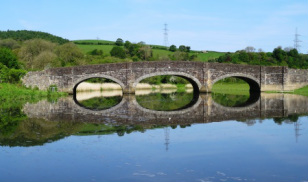 halfpenny bridge
halfpenny bridge
We
don’t see an otter, nor the sun turning the trees golden – but even on a cloudy
day the river is spectacular. Dave has earned his keep long before we turn back
to port, but he continues to regale us with stories. By the time we weave in
and out of the yachts moored off Instow, he’s revealed the origin of ‘under
dog’ ‘grinding to a halt’ ‘flotsam and jetsam’ and reminded mothers that not
long ago, they had to hide their young sons from the pressgangs. Dave’s trips
are aimed at tourists but I recommend them to locals, especially those in
Bideford and other towns, which overlook the river. I also recommend taking a cushion,
a waterproof layer - just in case, and a camera.
The three hour river trip is £20 per person. Dave also takes people bass fishing or on a shorter two hour trip round the estuary. Book the Cheeky Monkey on 01237 422307 or at Appledore Quay Gift Shop. She sails between May and the end of October.
The three hour river trip is £20 per person. Dave also takes people bass fishing or on a shorter two hour trip round the estuary. Book the Cheeky Monkey on 01237 422307 or at Appledore Quay Gift Shop. She sails between May and the end of October.
ALL ABOARD THE FENDER with Gary Stanbury
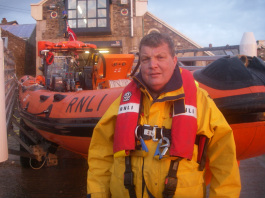 Gary outside Appledore RNLI
Gary outside Appledore RNLI
Gary Stanbury also takes passengers out fishing in the
estuary or upriver, heading for Weare Giffard. Gary’s open boat ‘Fender’ takes
up to six passengers. So it works well for one family to book the whole boat –
then they can do a bit of fishing and a bit of history and Gary can tailor
the trip to suit. Another speciality is
on Tuesday evenings, when Gary will take you out to watch the lifeboat crew on
exercise. Gary can give you chapter and verse on Appledore RNLI because he is helmsman
of the inshore lifeboat and has volunteered on the crew for 20 years or more. Just
in case you go on the Fender and want to prompt Gary about the daring rescue
which led to him being awarded the RNLI bronze medal, here is an extract from
an article I wrote for Devon Life a
few years ago called ‘One Big Family.’
‘I beg Gary
to tell me about the dramatic rescue, which earned him the medal. With James
and others listening, he’s reticent at first. It was night, on an ebbing tide
and three anglers in a tiny open fishing boat were being dragged towards the
surf, breaking over the infamous Bideford bar, which blocks the entrance to
Appledore and Instow at low water. “It wasn’t that they did anything wrong,”
adds Gary generously, “they even had a second engine, but it refused to start.”
In pitch blackness, Gary could hear the surf, but the fishermen’s only light
was a torch, he couldn’t see them. His first plan was to go through the big
waves straight for them, but he feared crashing into the stricken boat. So he
headed out beyond the bar, caught the crest of a wave, so he could see over the
top, surfed it, then at the last moment turned the boat into the waves, slowing
it, so he could pick up a fisherman as he raced past! Three times, Gary caught
a wave and steered the ILB close to the helpless fishing boat. Three times, his
crew dragged a fisherman aboard. His colleagues are ribbing him, until he says,
“It wasn’t about being brave, anyone of us would have done it.” And they point
out that it was coolness under pressure, working out how best to affect a
successful rescue in dangerous conditions that earned the crew their
recognition.’
Book the Fender directly with Gary on 07866 314260
Book the Fender directly with Gary on 07866 314260










